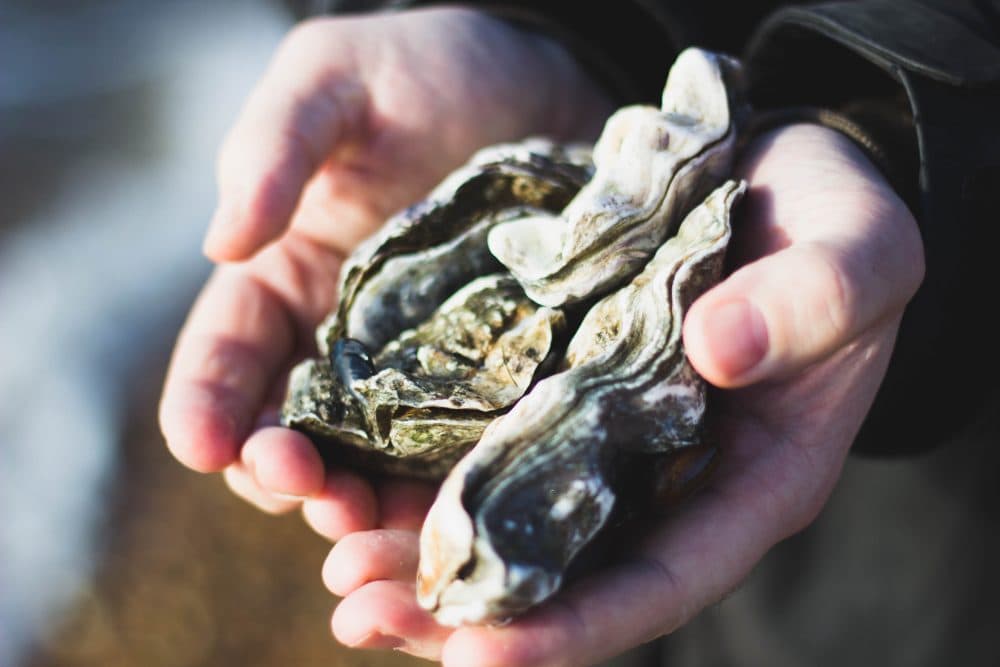Advertisement
Commentary
The Case For Eating Oysters — Even If You're A Vegan

As a vegetarian, I pass on summer delicacies I enjoyed as a child. Burgers and hot dogs off the grill? Not on my Fourth of July menu. Chicken? Only if it’s made of soy. Freshly caught bluefish or salmon? Mouth-watering but verboten.
Of course, from juicy tomatoes to corn on the cob, I savor summer’s vegetable bounty with everyone else. And there’s another summer staple I eat without guilt: oysters.
What’s more, even vegans, whose diets forbid animals and animal products like cheese and honey (both of which I permit myself), should feel free to savor oysters “by the boatload.” That goes for mussels, too.
Technically, vegans who eat these simple shellfish are “ostrovegans.” Guzzling them isn’t culinary sacrilege, if your goal is to avoid inflicting suffering on animals — not just slaughter but also the fear and discomfort of industrial husbandry’s inhumane confinement. The belief that oysters and mussels can feel pain and discomfort is as rooted in science as the nostrum that you shouldn’t eat the former in months with an “r” in their names.
Biology suggests that both bivalves are the functional equivalent of plants, without the capacity for pain. They lack what would be considered a central nervous system and brain. Nor can they move on their own. Evolutionists point out that motion and a nervous system are nature’s tools for sensing and moving away from painful stimuli.
Of course, we can’t be 100 percent sure they don’t feel pain in some way we don’t understand. But as a Slate writer noted, the same is true of plants. And humans must eat something.
Vegan philosopher Peter Singer, founding guru of the animal welfare movement in the 1970s, initially endorsed eating oysters in his groundbreaking book "Animal Liberation." He later retracted that endorsement, on the grounds that the science of their freedom-from-pain is not a lead-pipe cinch.
But he doesn’t extend the same benefit of the doubt to insects. When that Slate writer pressed Singer, he admirably declined to take a hard-and-fast, one-size-fits-all-eaters approach to oysters.
It’s worth remembering that no diet, even vegan, avoids killing animals: Harvesting plants leads to deaths of small mammals from machinery and pesticides.
Some meat shunners, of course, have motives beyond humanity for their diets — their health or that of the planet. But there, too, oysters and mussels don’t violate any code.
The vast majority of oysters we eat are farmed, with negligible environmental harm, including little concern that we’ll overfish them. Health? Oysters have numerous nutrients and are among the government’s recommended fish for children and pregnant women trying to avoid mercury.
Mussels, too, are loaded with nutrition and are low in mercury. Sustainability is more of an issue with them, however, as they often are dredged from sea beds, a process that can damage the ecosystem. But shellfish dredging’s harm can be brief and mitigated, and, for eco-conscious eaters, mussels also can be grown on ropes in tanks.
In the end, Singer’s flexibility is wise. It’s a free country, full of people with different levels of risk aversion to uncertainty and different ethical lodestars. We each must choose our own diet. But you needn’t be shamed when hard-core vegans finger-wag over that plate of oysters you enjoy at your summer barbeque.
Perhaps someday we’ll be past this discussion. The late conservative (and meat-eating) columnist Charles Krauthammer forecast a future in which meat-eating and the animal cruelty it entails would seem as retrograde as slavery does to us.
Technology advances, he wrote, probably will produces veggie meat as succulent as the real thing. When meat-making capitalists put their dollars behind veggie burgers (Tyson Foods is but one), that future may be closer than even Krauthammer predicted.
And if they can make fake steer that tastes like the real thing, can fake oysters be far behind?
